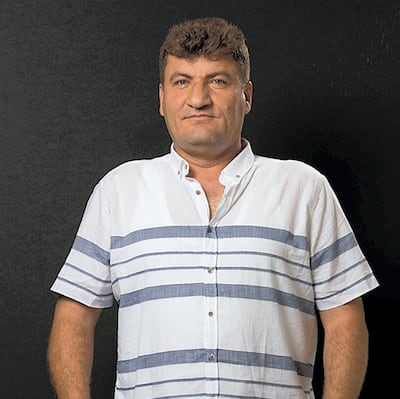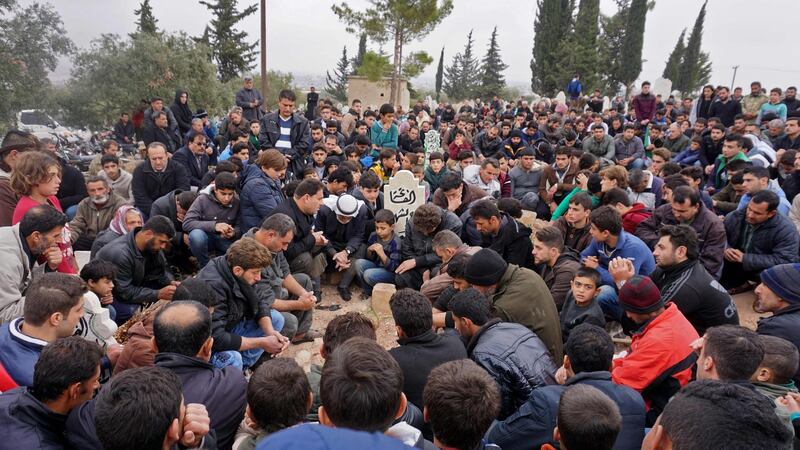The assassination of Raed Fares, a prominent and witty pro-democracy Syrian figure based in Idlib, has sent shock waves through the activist community who looked up to him as a symbol of courage and endurance.
Fares, 46, was shot dead in his car on Friday by unknown militants, along with fellow activist and photographer Hammud Al Junayd, in the town of Kafranbel where he was based.
Although he had survived previous assassination attempts and was aware that Islamists were still intent on killing him, Fares refused to leave his home country, convinced that he was more useful within Syria than outside.
“In the past few days, his behaviour had changed. He knew he was under threat. He would be careful to drive different ways to and from work,” said Muhamad Al Salloum, a Syrian journalist based in Istanbul and a close friend of Fares. “When we spoke on the phone, I could feel his increasing despair as Islamists got stronger in the region."

A deal brokered by Russia and Turkey has spared Idlib, which is dominated by Hayat Tahrir Al Sham, an alliance led by Syria’s former Al Qaeda branch, from a full-on assault by the Syrian regime.
Fares’ violent death is the latest of a string of killings that have decimated the ranks of secular anti-regime activists since the beginning of the Syrian civil war.
Many of his friends shared an old picture of him and Al Junayd standing in a field and playfully scratching the head of Khaled Al Essa, a 24-year-old Syrian journalist who died of wounds sustained in an attack in Aleppo in 2016.
"This is a glimpse into Paradise right now. RIP Raed, Khaled and Hamod," wrote Kenan Rahmani, advocacy manager at The Syria Campaign, on Facebook.
“Symbolically, his death speaks volumes. He was one of the last free brave voices left," said Mansour Omari, a Sweden-based human rights activists who occasionally worked with Fares. “Those who control Syria today — Islamist extremists, Assad and Kurds — don’t like dissenting voices."
Mr Al Salloum agrees. “These past few years, the voice of civil society activists had already been weakened with Assad’s increasing military operations, Russia’s support and the spread of Islamic groups," he said. “The death of Fares is a huge blow and will weaken it further."
_______________
Editorial: Raed Fares was a voice of hope, brutally silenced
_______________
After nearly eight years of war, President Bashar Al Assad has retaken roughly 60 per cent of Syria, while the Kurds control the north-east of the country.
Several of Fares’ closest colleagues say they now fear for their lives.
Prominent journalist Hadi Abdullah told The National that he has gone into hiding for a few days. "I think I'm the next target."
However, he will not flee Syria, like hundreds of thousands have done before him. Abdullah said that he, Fares and Al Junayd had sworn to each other that they would never leave the country. “We must continue his work to tell the world how much we love him," he said.
The sole survivor of the attack on Fares, Ali Dandoush, said that rumours had started spreading that he tipped off the assassins. “I have to be very careful," said the photographer, who used to live and work with Fares.
At the time of his death, Fares was struggling to secure financial aid for his projects, which included Radio Fresh, initially set up with support from the United States.
"Recent history has shown us again and again that enduring peace depends on the existence of a vibrant civil society and free political discourse, a marketplace of ideas where new voices can challenge dictatorship and terrorism," Fares wrote last June in the Washington Post. "Without groups like Radio Fresh to provide alternative messages, another generation will take up arms."
In a war that has become a synonym for extreme brutality, Fares, a former real estate agent, continued advocating for non-violence. “Take a look, take a deep look, do you see any terrorists?” he tweeted alongside a picture of anti-Assad protesters near Idlib last September.
Maart alNuman, Idleb, Syria 14 Sep 2018
— Raed Fares (@RaedFares4) September 14, 2018
take a look , take a deep look, do you see terrorists?
Russia & Assad are preparing to attack those ppl, those ppl are here to say: stop the war criminals: Putin & Assad pic.twitter.com/t4Ep3EsBcu
His pacifist approach inspired many to follow in his footsteps. “The first time I met Raed, I was with a group of protesters on our way to burn a police station down," said Abdallah Al Sallaoum, a close friend of Fares who worked with him in Kafranbel. “He explained to me why it was wrong, and from that moment I followed him”.
But Fares had become more than just a role model among his peers. He managed to grip the world’s attention by posting pictures of placards written in English, challenging the West to face the reality of war in Syria. “Obama! Your role in Syria will never be accepted as a mistake like Clinton’s Rwanda," read one.
“It was a brilliant move," said Fadel Abdul Ghany, chairman of the Syrian Network for Human Rights monitoring group. “They were simple but smart messages that resonated throughout the world."
Mr Fares' satirical video, "The Syrian revolution in 3 minutes", in which actors dressed as cavemen grunt their way through a simplified timeline of the Syrian war, sarin gas attack included, has more than 120,000 views on YouTube.
From the beginning, Fares' humorous take on the war stood out. "We wanted to be special. There were thousands of people demonstrating, and we were, like, 50 people in a field, and we wanted to be on Al Jazeera," he told the New York Times in 2014.
Asked what he would do if Islamists or Mr Al Assad succeeded in killing him, he answered simply: “I have sons."






